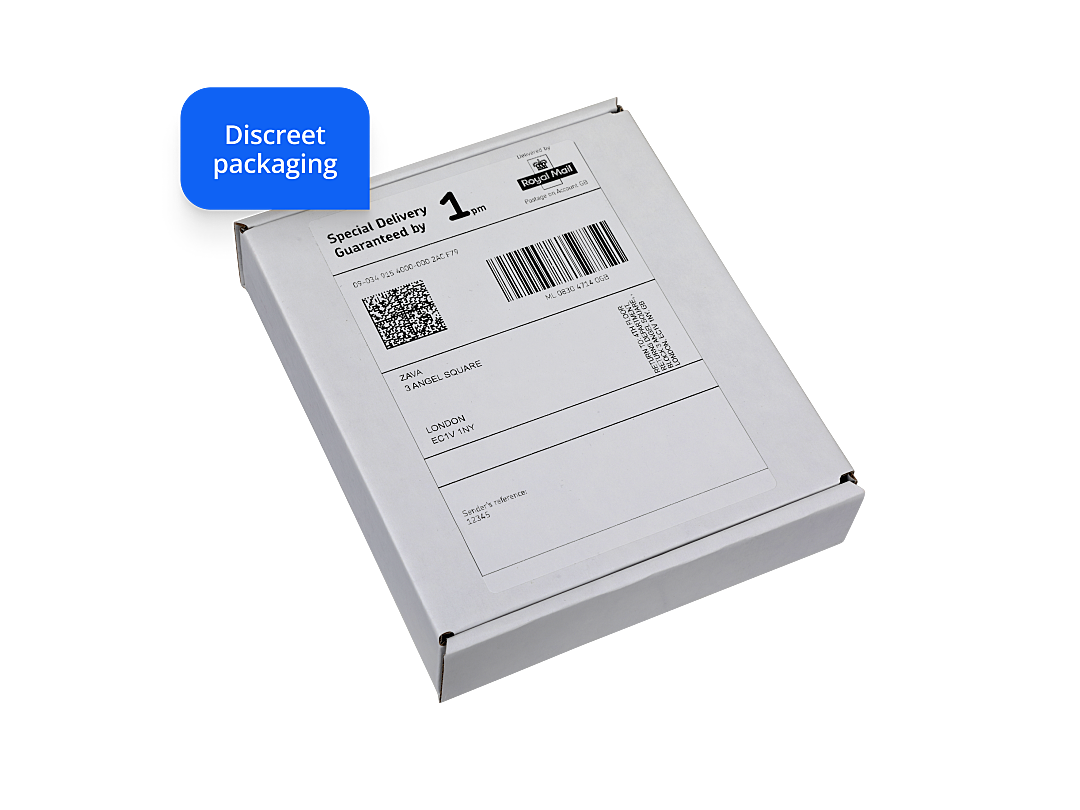Ovranette
Ovranette is a generic combined contraceptive pill and a reliable way to prevent pregnancy.




Prices from £15.00
In stock. Simply fill in a brief consultation questionnaire and one of our doctors will review your request today.
-
Ovranette is a pill you can take to protect yourself from getting pregnant. Each Ovranette pill contains 2 active ingredients which are similar to your natural female sex hormones.
An Ovranette pill contains:
- 150 micrograms of levonorgestrel (a progesterone)
- 30 micrograms of ethinylestradiol (an oestrogen)
You can take 1 Ovranette pill each day for 21 days and then take a 7 day pill free break. You’ll be protected from pregnancy for all 28 days if you take Ovranette as instructed.
Ovranette is a branded medication manufactured by Pfizer. Read more



About Ovranette
-
-
Ovranette is a combined oral contraceptive pill taken to prevent pregnancy. Ovranette contains hormones that are similar to your body’s natural sex hormones:
- oestrogen, as ethinylestradiol in Ovranette
- progesterone, as levonorgestrel in Ovranette
The levels of oestrogen and progesterone control your menstrual cycle and ovulation (when your ovary releases an egg). When you take Ovranette, you stop the process of ovulation. This prevents sperm from fertilising your egg, which stops pregnancy from taking place.
Ovranette is a 21 day pill which means you can take a pill for 21 days before taking a 4 or 7 day break. During this break, you will have contraceptive protection as long as you start the next pack of pills straight after and didn’t miss any pills in the 7 days before your break.
You will have some withdrawal bleeding during the 7 day break. This should be lighter and less painful than your normal period. For this reason, Ovranette can be used to manage conditions like endometriosis or painful periods.
Newer ways of taking Ovranette mean you can take this every day without a break. You can also choose to take a 4 to 7 day break if bleeding occurs, provided you’ve taken Ovranette for at least 7 days in a row beforehand. Or you can choose to take 3 strips of Ovranette back to back and have a 4 to 7 day break at the end of the third strip.
Ovranette will not protect you against sexually transmitted infections (STIs). The type of contraceptive that protects you from STIs are condoms. You can get more advice about sexual health from a healthcare professional or your local sexual health clinic.
-
-
You can take an Ovranette pill once a day, starting on the first day of your period. This way you’ll be protected against pregnancy from the first dose, provided you have regular periods. If you have irregular periods or start at any other time, you need to use condoms for the first 7 days of taking Ovranette if you have sex.
Each blister strip has the days of the week marked on the foil with arrows to help you remember to take them.
When taking Ovranette, remember to:
- take your pill at the same time each day
- follow the arrows on the strip until you have taken all 21 pills
You will then have a 7 day pill free week. During this week you will still be protected against pregnancy provided you start the next strip of pills straight after 7 days and haven’t missed any pills in the 7 days before your break.
You may have some withdrawal bleeding during this week. Make sure to start your next strip of pills on time even if you are still bleeding.
What if I miss a pill?
If you forget to take your pill, check how long it’s been since you would normally take it.
If it’s been:
- less than 24 hours, take your pill as soon as you remember. You do not need to use extra contraception as you will still have contraceptive protection.
- more than 24 hours, take the most recent pill as soon as you remember. This might mean taking 2 pills on the same day. Providing you’ve not missed any other pills in the previous 7 days and can keep taking your pill as normal then you’ll still have contraceptive cover.
If you start your next strip more than 48 hours late following a 7 day break (or you miss 2 to 7 pills in the first week of your pack) then you might need to take emergency contraception.
If you miss 2 to 7 pills in week 2 or 3 of your strip of Levest then emergency contraception isn’t needed provided you’ve taken the pills as instructed in the previous 7 days. You should continue your pill as normal, use condoms for the next 7 days and move straight to your next strip without a break if you missed pills in week 3.
If you miss more than 7 pills at any point then you might need to take emergency contraception. You’d need to take a pregnancy test 3 weeks after any episodes of unprotected sex.
For more information about what to do if you forget to take your pill, check out our missed pill guide.
-
-
Ovranette works by preventing pregnancy from taking place by temporarily adjusting the natural hormones in your body.
Ovranette contains 2 different hormones, ethinylestradiol and levonorgestrel. They work in a similar way to your body’s natural hormones, oestrogen and progesterone.
When you take a steady dose of these hormones over 21 days, your ovaries are prevented from releasing an egg. This means you will not be able to get pregnant.
Ovranette can also prevent sperm from entering your cervix by thickening the cervical mucus. The hormones can make the lining of your uterus (womb) thinner, reducing the chances of a fertilised egg from implanting itself.
-
-
When taken properly, Ovranette is around 99% effective in preventing pregnancy. When taking into account missed pills, Ovranette is about 91% effective.
If you have regular periods and start taking Ovranette on the first day of your period, you will be protected against pregnancy straight away.
If you start on any other day, you’ll have to use extra contraception, such as condoms, for 7 days.
-
-
Most side effects of Ovranette will disappear as you continue to take the pill. Some side effects take a couple of weeks to resolve while others may take a month or two.
Speak to your doctor or pharmacist if you are concerned about any side effects of the combined pill.
Some common side effects of Ovranette include:
- headaches
- breakthrough bleeding in the first 3 months
- vaginal infections such as thrush
- feeling sick or being sick
- stomach cramps
- mood changes
- dizziness
- changes in sex drive
- acne
- breast tenderness
Uncommon side effects of Ovranette include:
- diarrhoea
- appetite changes
- rashes or hives
- fluid retention
- increase in blood pressure
- changes in the fat levels (cholesterol) in your blood
If you start having migraines or notice a rise in your blood pressure readings whilst taking Ovranette it’s important to contact your doctor and change to an alternative method of contraception as soon as possible. It’s also important to have a chat with your doctor if you notice any breast changes.
Though the manufacturer of Ovranette lists weight gain as a potential side effect, more up to date studies have found there isn’t a link between the contraceptive pill and weight gain.
Taking the combined contraceptive pill can increase your risk of blood clots. As a woman, you will have a slight risk of blood clots even if you are not taking the pill:
- out of 10,000 women who are not taking the pill, around 2 will get blood clots per year
- out of 10,000 women who are taking Ovranette, around 5 to 7 will get blood clots per year
However, pregnancy increases your risk of blood clots even more than taking the pill.
If you notice any signs of a blood clot, stop taking Ovranette and call 999 immediately. These signs include:
- chest pain
- shortness of breath or difficulty breathing
- pain or tenderness in your leg
- dizziness
- coughing up blood
If you suffer with any serious side effects please contact a doctor urgently.
For a full list of the possible side effects of Ovranette, read the patient information leaflet.
-
-
You can take Ovranette if you are a sexually active woman and want to prevent pregnancy. Some women also use Ovranette to manage other conditions such as endometriosis or acne.
You should not take Ovranette if you:
- are pregnant or think you might be pregnant
- are breastfeeding a baby under 6 weeks old
- are allergic to any of the ingredients in Ovranette
- are over 35 years old and smoke
- have a BMI of 35 or above
- have cancer affected by sex hormones such as breast cancer
- have unexplained vaginal bleeding
- have ever had a heart attack, stroke or blood clots
- have a history of high blood pressure
- have a condition that makes you more likely to get a blood clot
- have migraines with aura
- have severe diabetes
- have severe liver disease
Other factors can affect whether Ovranette is suitable for you. You should speak to your Doctor if:
You are breastfeeding a baby over 6 weeks old
- have systemic lupus erythematosus (SLE)
- have had an organ transplant
- have conditions affecting your heart
- have gallbladder disease
- have liver disease
- have recently given birth
- are due to have an operation
- have any gastric conditions
- take any medications that interact with the pill
For more information, read the patient information leaflet. You should always speak to a doctor before starting Ovranette to make sure this is suitable for you.
-
-
Some other medications can interfere with the way Ovranette works and make it less effective or vice versa.
Tell your doctor if you take any other medications, including:
- treatment for tuberculosis, such as rifampicin
- HIV treatment, such as ritonavir
- epilepsy treatment, such as carbamazepine, phenytoin or phenobarbital
- St John’s wort, a herbal product for low moods
- antifungal medication, such as griseofulvin
- modafinil, a sleep disorder medication
- ellaOne, a morning after pill
Your doctor or pharmacist will be able to advise you on medication interactions with Ovranette.
-
-
There are several alternative treatments to Ovranette that you can use for contraception. The type of contraception you use will depend on your preference.
If you’d like to continue using a combined pill, there are a few options you can choose from. All combined pills contain ethinylestradiol and a different progesterone-like component:
You may not be able to take oestrogen containing products or find that ethinylestradiol gives you side effects. In this case, you can choose a progesterone only pill, otherwise known as the mini pill.
You can request the mini pill from ZAVA, including:
If you want to try a non hormonal method of contraception, there are a few options to consider. These include having an intrauterine device (IUD) fitted or using a diaphragm with spermicide.
If you do not think Ovranette is right for you, speak to your doctor or family planning clinic. They can advise you on an alternative contraceptive method that is right for you.

Dr Clair Grainger studied at The University of Edinburgh from 2004 to 2009. She's worked in hospitals throughout Edinburgh and London before completing her GP training in North Middlesex Hospital in 2017.
Meet our doctorsLast reviewed: 17 Feb 2022
-
Ovranette 150/30, Product Information Leaflet [accessed February 2021]
-
Clinical guideline: Combined hormonal contraception, FSRH [accessed February 2022]
-
Drug interactions with hormonal contraception, FSRH [accessed February 2022]
-
Recommended actions after incorrect use of combined hormonal contraception, FSRH [accessed February 2022]
-
Combined pill, National Health Service [accessed February 2022]
Contraceptive pills are a reliable way of reducing your risk of getting pregnant from sex. ZAVA offers most common brands of pill, so you can order your preferred brand by visiting our contraceptive pill service page.
In stock. Prices from £15.00








